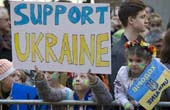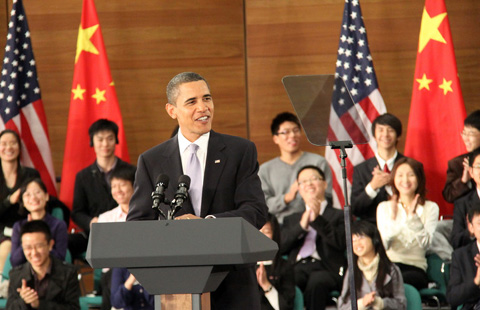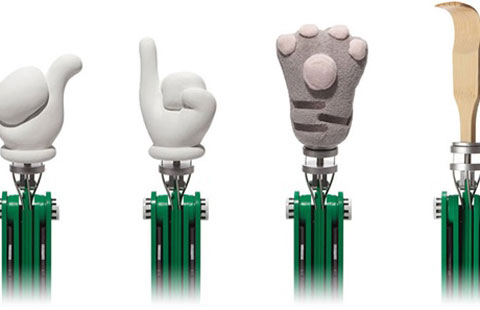Three dead in east Ukraine, Putin warns of "abyss"
(Agencies) Updated: 2014-04-17 20:13Separatists attacked a base of the Ukrainian national guard overnight and Kiev said three separatists were killed, the worst bloodshed yet in a 10-day pro-Russian uprising in east Ukraine, overshadowing crisis talks to resolve the conflict.
Ukrainian, Russian and Western diplomats arrived for the emergency talks in Geneva, but there was little hope of any progress in resolving a crisis that has seen armed pro-Russian fighters seize whole swathes of Ukraine, while Moscow masses tens of thousands of troops on the frontier.
President Vladimir Putin, who overturned decades of post-Cold War diplomacy last month by declaring Russia's right to intervene in neighboring countries and annexing Ukraine's Crimea region, accused the authorities in Kiev of plunging the country into an "abyss".
Kiev fears that he will use any violence as a pretext to launch an invasion.
"Instead of realizing that there is something wrong with the Ukrainian government and attempting dialogue, they made more threats of force ... This is another very grave crime by Kiev's current leaders," Putin said in a televised question-and-answer session with the Russian public that has become an annual event.
"I hope that they are able to realize what a pit, what an abyss the current authorities are in and dragging the country into," said Putin, who dismissed as "rubbish" accusations that Russian agents were acting in east Ukraine.
At the national guard headquarters in Mariupol there was clear evidence that the building had come under attack.
A single grey police jeep was inside the compound on Thursday morning with broken windows, flat tyres and bent doors. The gates of the compound had been flattened. There were shell casings outside the gates and several unused petrol bombs.
"They came here around 8:15 p.m., demanding that we surrender our weapons and join the people. There were some women with them, but then they left," said police major Oleksandr Kolesnichenko, deputy commander of the base.
"Then they used a truck to break through the gate. There was some incoming fire. I could not see who was shooting - it was dark," he said. "We fired first in the air. We fired warning shots after they entered the compound. We had no casualties. We are safe."
A separatist representative, who gave his name only as Sergei, said there had been a peaceful rally at the base.
"We had a peaceful rally to urge the police to join the people. The commander of the compound warned he would order troops to shoot to kill."
"Then there was shooting. Some people came with Molotov cocktails. We have verified that one person is dead and more than 10 wounded."
Interior Minister Arsen Avakov said an armed group of about 300 separatists attacked the base with guns and petrol bombs. Three separatists were killed and 13 wounded, he said. No guardsmen were hurt.
The new deadly clashes took place hours after a modest Ukrainian military operation to recapture territory elsewhere from armed pro-Russian rebels ended in disarray on Wednesday, with troops surrendering rather than open fire.
Pro-Russian militants control buildings in about 10 towns in eastern Ukraine after launching their uprising on April 6. In the biggest province in the region they have declared an independent "People's Republic of Donetsk".
On Wednesday, an armoured column of Ukrainian paratroops was humiliated in an attempt to retake some towns. Pro-Moscow separatists took control of some of their armoured vehicles and crowds surrounded another column, forcing the troops to hand over the pins from their rifles and retreat.
Acting President Oleksander Turchinov said on Thursday the entire paratroop brigade would now be disbanded and those who surrendered would be punished.
Consequences
European countries and the United States are threatening Russia with more sanctions unless it takes steps at the Geneva meeting to show it will de-escalate the conflict in Ukraine, although officials say they expect no breakthrough.
So far, diplomacy has failed to keep up with events on the ground, with Russia's partisans seizing control of territory before Western countries can formulate a response.
Bloodshed has been limited so far during the uprising in the east, with two people killed on Sunday, including a member of the Ukrainian state security forces shot dead. Kiev says it is doing all it can to avoid any shooting.
The United States and European Union have so far imposed visa bans and asset freezes on a small number of Russian individuals, a response that Moscow has openly mocked. However, the Western states say they are now contemplating more serious measures that could hurt Russia's economy more broadly, which could be put into place shortly after Thursday's Geneva meeting.
"What I have said consistently is that each time Russia takes these kinds of steps that are designed to violate their sovereignty, that there are going to be consequences," US President Barack Obama said on Wednesday in an interview with CBS. Using words unheard since the Cold War, he said the United States had stronger conventional military forces than Russia, and neither side wanted a conflict.
"We don't need a war," he said.
Western countries have repeatedly made clear they are not prepared to fight for Ukraine, but the NATO alliance announced military deployments on Wednesday to beef up defences of member states such as Poland and the Baltic countries, which feel threatened by Russian action nearby.
Upon arriving in Geneva on Wednesday, Ukrainian Foreign Minister Andriy Deshchytsia said there was still time for negotiations to ease tensions with Russia.
"I think that we still have a chance to de-escalate the situation using the diplomatic means," he said. "And we will try hard. We are trying hard - not only Ukraine - but also the United States. However, the time is now, not only to express the concerns, but to look for a more concrete and adequate response to Russia's plans and actions."
Kiev and the West believe Russian agents are directing the insurgency in the east. A US official said Washington was looking for evidence in Geneva that Russia would stop.
"The idea here is that they would stop aiding and abetting and supporting these separatists and that they would pull their troops back from the borders," the official told reporters as Secretary of State John Kerry flew to Geneva.
The European Commission took a step towards preparing for wider sanctions, handing documents to EU member states on Wednesday explaining the potential impact on their economies of stricter trade and financial measures, diplomats said.
The documents examine energy, finance, trade and other areas. A number of EU countries that rely heavily on Russian gas supplies are nervous about possible retaliation from Moscow, and at least one EU diplomat said the measures had to be balanced.










